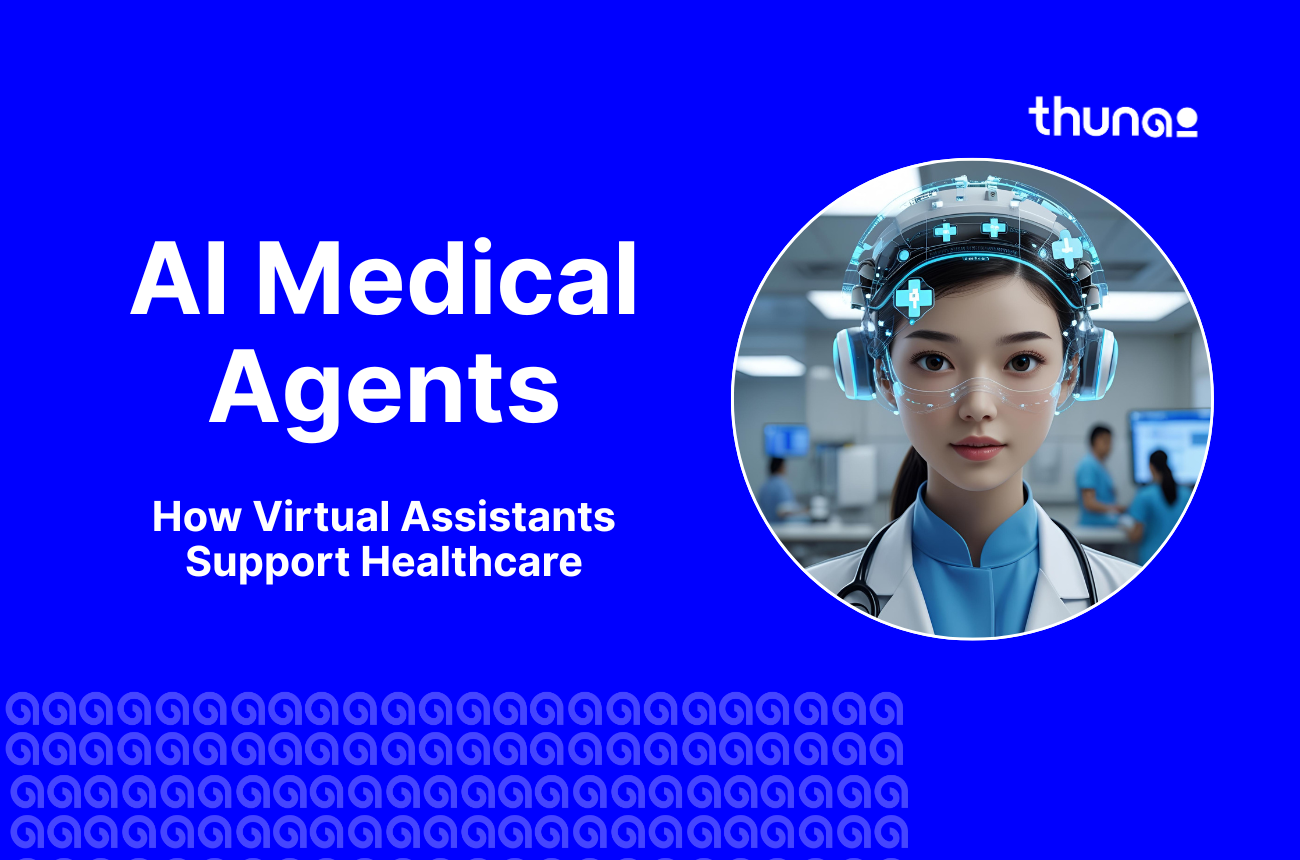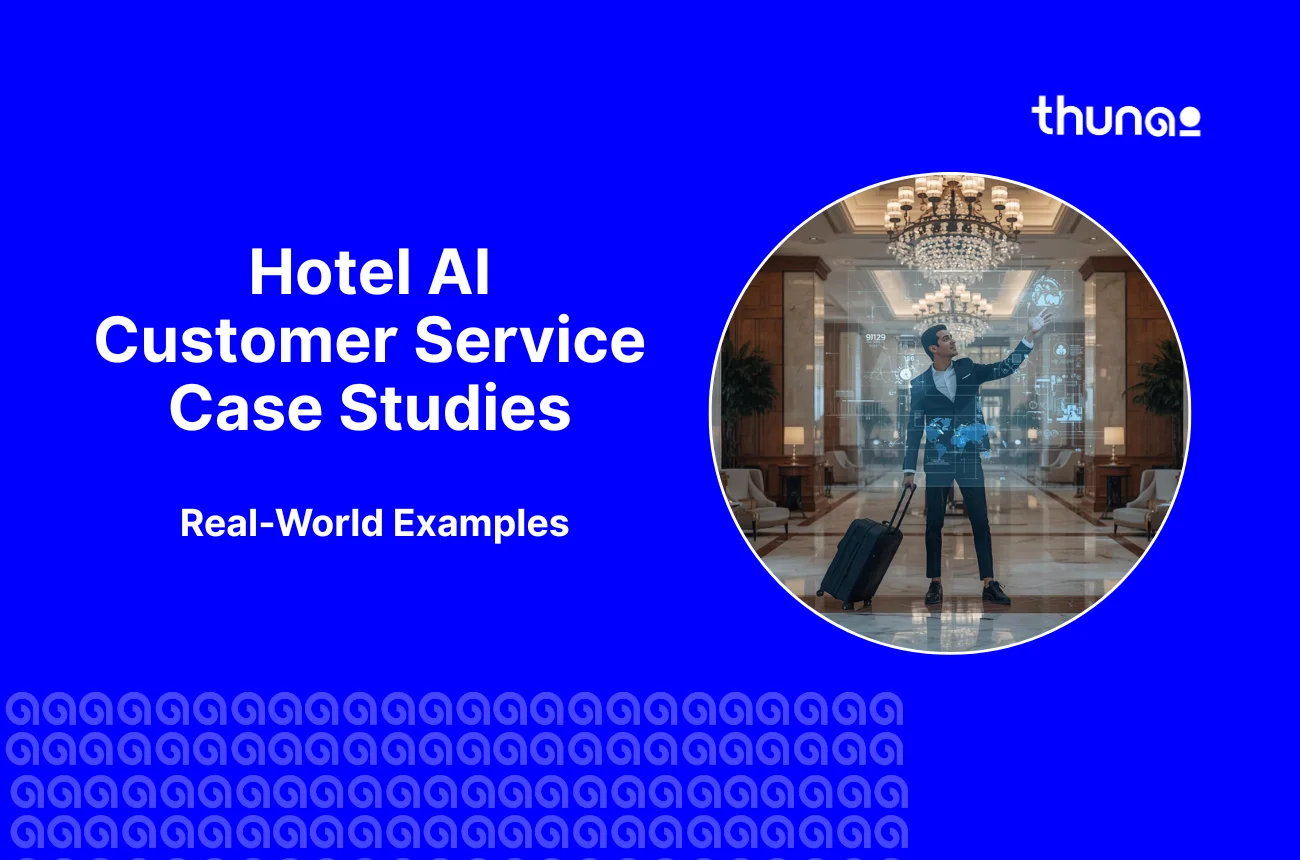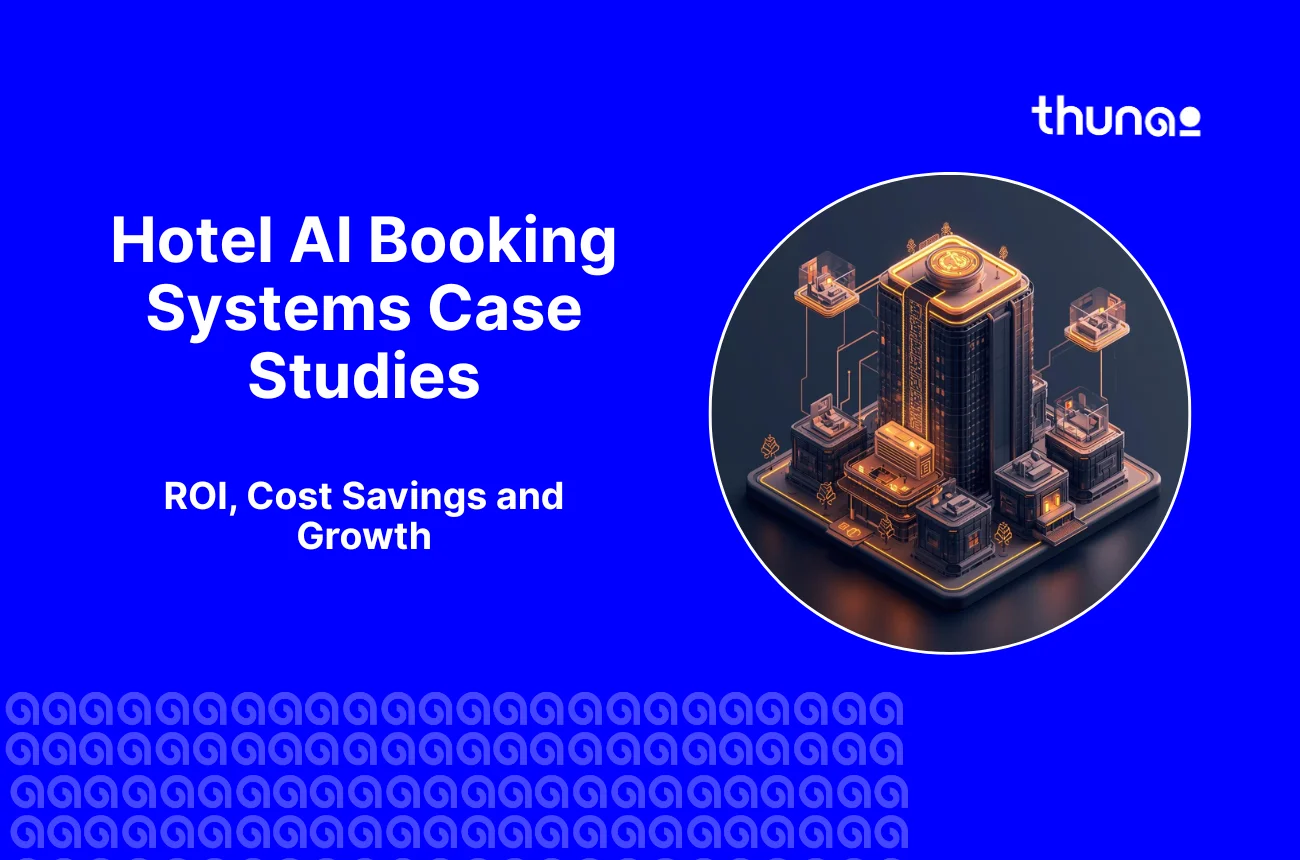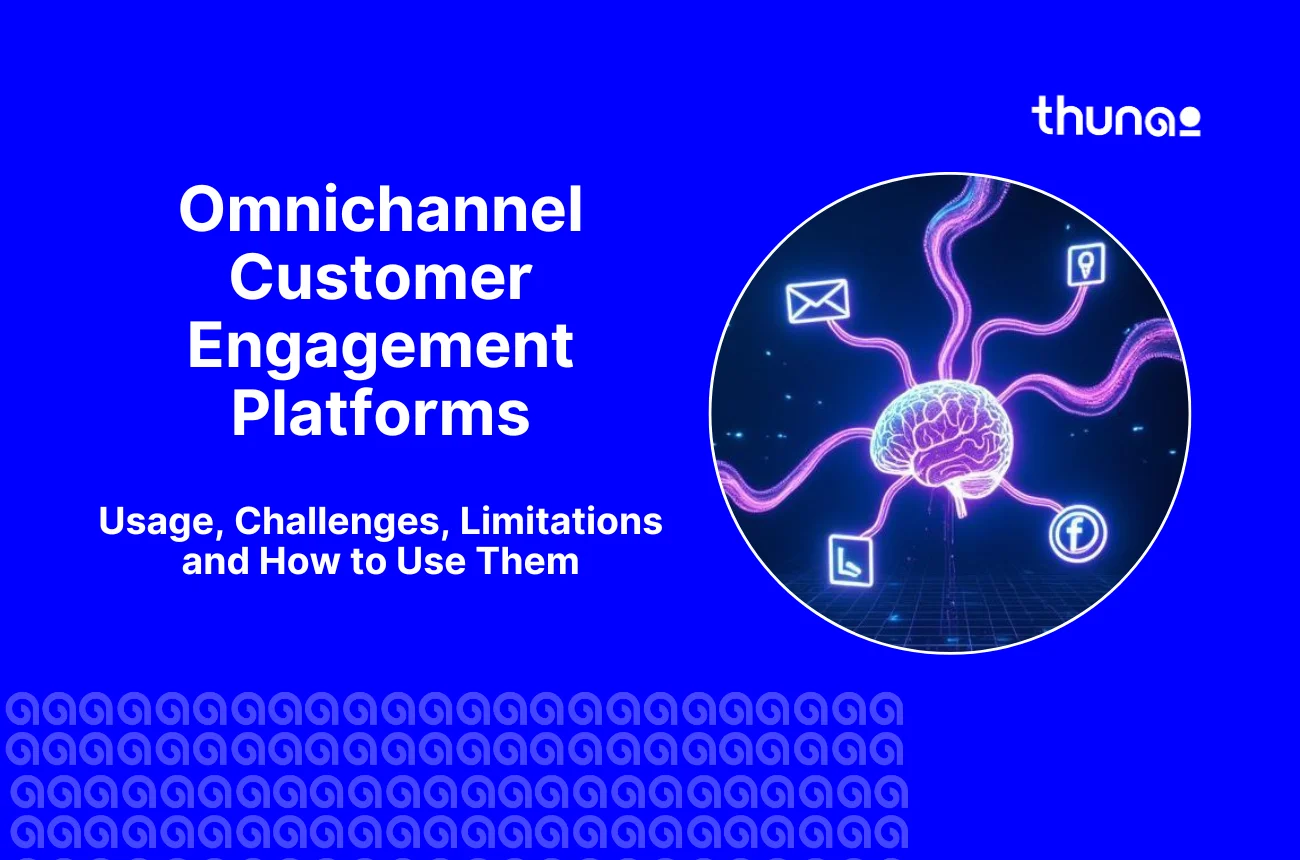Medical AI Agents: How Virtual Assistants Support Healthcare



Thunai learns, listens, communicates, and automates workflows for your revenue generation team - Sales, Marketing and Customer Success.
What Are Medical AI Agents?
A Medical AI Agent is an autonomous AI system. It is designed to understand high-level clinical and administrative goals. It then independently executes the multi-step tasks needed to achieve them.
These tools include your EHR, lab portals, and communication systems. The most advanced agents operate within strict clinical and ethical boundaries that you define.
There is a key distinction to make. Many AI tools simply find or generate information. Medical AI Agents are built to take action. Medical AI agents do not just show you a patient’s history. They summarize it, flag key findings, and draft a preliminary assessment based on your criteria.
Use Cases for Medical AI Agents in Clinical Environments
Deploying medical AI agents can fundamentally change clinical operations. The benefits go beyond simple efficiency gains. The use cases of AI healthcare are expected to grow to a $4.96 billion industry by 2023. These systems can help with complex challenges that have long affected the healthcare field.
- Automate Ambient Clinical Documentation
Physicians spend a great deal of time on administrative tasks, often two hours for every one hour of patient care. The EHR is a major reason for this.
- A medical AI agent can process the audio from a patient-doctor conversation.
- Using a medical AI agent will allow you to intelligently transcribe it and structure the data into a perfect SOAP note in the EHR. This all happens in real-time.
- This gets rid of after-hours charting and captures richer, more accurate patient narratives.
- Make Prior Authorizations and Billing More Efficient
The prior authorization process is a well-known bottleneck. In fact the demand for automation, shortage of skilled healthcare professionals is what makes Medical AI agents so powerful.
- A Medical AI agent can be given a goal, for example, to get prior authorization for a specific patient's MRI.
- The AI agent in healthcare would then access the patient's record and pull the needed clinical notes.
- It would navigate to the specific insurer's portal, fill out the complex forms, and track
The request to completion. Medical AI agents would escalate to a human only if an appeal is needed.
- Conduct Intelligent Patient Intake and Triage
Before an appointment, an AI agent can communicate with a patient through text or a web portal.
- The virtual medical assistant can ask dynamic, clinically relevant questions based on their stated reason for the visit. Medical AI agents can gather a detailed history, medication list, and symptoms.
- This information is then neatly summarized for the physician. This can turn a 15-minute intake process into a 2-minute review.
- Augment Clinical Decision Support
An agent can act as a powerful analytical partner. A clinician may have a patient with a complex presentation. In fact, AI in healthcare is now helping with diagnostic imaging in cardiology, neurology, and dermatology.
- Medical AI agents can instantly scan their entire longitudinal record and analyze recent lab results. It can also cross-reference the information against global medical literature.
- It then presents the clinician with a list of potential differential diagnoses, flagged drug interactions, or relevant clinical trial information.
- This support for the clinician's expertise using AI tools in healthcare helps make certain no important detail is missed.
- Manage Population Health and Care Gaps
A primary medical AI agent can be tasked with closing care gaps for a diabetic population. These virtual medical assistants can then delegate sub-tasks to other specialized medical ai agents.
- One medical AI agent could identify all patients overdue for an A1c test. Another could initiate automated outreach to schedule appointments. A third could track outcomes.
- This proactive method for population health was once too labor-intensive to be practical but can enable using AI tools in healthcare.

How a Medical AI Agent Works in Practice: A Real-World Scenario
Let's examine a tangible situation. A primary care physician is seeing a patient with a history of hypertension. The patient now complains of fatigue and shortness of breath.
A simple transcription tool would just create a block of text. An agentic AI system, in contrast, manages the entire information workflow:
- Medical AI Agents Listen and Understand Context: The virtual medical assistant processes the natural conversation. It understands the main symptoms like fatigue and dyspnea. More importantly, it connects them to the patient's existing condition of hypertension. Medical AI agents recognize clinical details.
- The AI Tool Formulates a Plan: The Medical AI agent's goal is to fully support the physician's diagnostic process. Its plan is to:
1. Transcribe the session for the note.
2. Pull and trend the patient's blood pressure readings from the EHR.
3. Check for recent lab work, such as kidney function or CBC.
4. Identify potential drug interactions in the patient's medication list.
5. Pre-draft an order for an EKG and a basic metabolic panel based on standard protocols for these symptoms.
- The Virtual Medical Assistant Executes with Connected Tools: The agent works in the background. It transcribes the conversation into a structured SOAP note. At the same time, it queries the EHR database. It displays a graph of the patient's blood pressure over the last 12 months. It flags that the patient's lisinopril dose was recently increased. Finally, it populates the orders section of the EHR with the suggested EKG and lab tests. These are then ready for the doctor's one-click sign-off.
- The Medical AI Agent Closes the Loop: The physician confirms the orders and signs the note, which is already 90% complete. They then discuss the plan with the patient. The medical AI agent has saved the physician 10 to 15 minutes of clicking and typing. This allows the doctor to direct their full attention to the patient's concerns and medical decision-making with AI tools in healthcare speeding up the other tasks.
Risks, Challenges, and Ethical Considerations
Introducing this powerful technology into a clinical setting requires a deliberate and cautious method. The stakes are higher than in any other industry. This demands a concentration on safety, privacy, and accountability.
1. Data Privacy and HIPAA Compliance
The single greatest concern is the protection of Protected Health Information (PHI). Any AI agent in healthcare operating in a healthcare context must be built on a foundation of absolute security.
- This means making certain of end-to-end encryption for all data, both in transit and at rest. The vendor must be willing to sign a Business Associate Agreement (BAA).
- This legally obligates them to uphold all HIPAA standards. Data should never be used to train general models without being fully and irreversibly de-identified according to HIPAA's official methods.
2. Over-Reliance on AI Suggestions
Clinicians are trained to use their judgment. However, a phenomenon known as automation bias can occur. This is when humans begin to uncritically accept AI-generated suggestions. This is a significant risk.
- The best practice is to design these systems as support tools, not as replacements for professional judgment. The medical ai agents should surface information, highlight possibilities, and handle tedious tasks.
- The final clinical judgment and accountability must always rest with the human medical expert. The user interface should clearly distinguish between AI suggestions and confirmed facts.
3. Explainability in Clinical Decisions
If an AI agent suggests a rare diagnosis or flags a subtle trend, the clinician must be able to ask why. An AI whose reasoning is opaque is unacceptable in medicine.
- The demand is for Explainable AI (XAI), where the system can show its work. For example, if it flags a drug interaction, it should be able to cite the specific PDR data or clinical study that supports its conclusion.
- This transparency is very important for building trust and for safe clinical practice.
4. Legal Implications of AI-generated Advice
The legal and regulatory landscape for AI in medicine is still developing. Who is liable if an AI agent makes a mistake that contributes to a poor patient outcome? Is it the physician who accepted the suggestion? Is it the hospital that procured the system, or the company that developed the AI? This is a complex legal gray area.
- For now, the prevailing model is that AI is a support tool. The licensed human expert remains the legally responsible party.
- This reinforces the need for systems that support, rather than replace, human oversight and judgment.
The Future of AI Tools in Healthcare
- Shift from Diagnostic Assistance to Autonomous Operations: Future healthcare AI is moving beyond identifying patterns in medical images or data. The next generation of tools will function as agentic AI systems. These systems will autonomously manage complex, multi-step clinical and administrative duties. For example, medical ai agents can handle an entire prior authorization process.
- Hyper-Personalization of Medicine and Accelerated Drug Discovery: AI will make a significant change from generalized treatments to highly personalized medicine possible. AI models will analyze an individual's unique genomic data, lifestyle factors, and real-time biometric information. From this analysis, they will create specialized treatment and preventative care plans. In the pharmaceutical field, this same analytical power is drastically shortening the drug discovery timeline.
- Combination of Multimodal AI for Complete Patient Insights: Future AI systems will not be limited to analyzing one type of data, such as only CT scans or only text-based health records. Instead, they will be multimodal. This means medical ai agents are capable of simultaneously interpreting diverse types of information. These information types include medical imaging, genomic sequences, pathology reports, lab results, and even the spoken words from a doctor-patient conversation.
- Increased Attention on Proactive Health Monitoring and Decentralized Care: The direction of healthcare will increasingly move from reactive treatment to proactive prevention, supported by AI-powered remote monitoring. Wearable sensors and at-home diagnostic tools will continuously send data to AI platforms. These platforms monitor for subtle changes from a person's normal health baseline. This process allows for the prediction and early detection of potential health issues, like cardiac events or the start of chronic conditions, long before symptoms become apparent.
Bring an AI Teammate to Your Practice with Thunai
Thunai’s medical AI agents can be built by clinicians for clinicians. Medical ai agents function like members of your care team.
Our medical AI agents manage ambient documentation, clear administrative backlogs, and give intelligent clinical support. They also work with your existing EHR.
Are you ready to lessen the administrative burden and put your attention back on your patients?
Learn more about Thunai and schedule a demo of your first autonomous clinical assistant.
FAQs for AI Medical Agents
What is the main job of a Medical AI Agent?
The main job of a Medical AI Agent is to act as an autonomous clinical and administrative assistant. You can delegate a complex goal, like preparing a patient's chart for a visit or handling a prior authorization. The agent then independently figures out the needed steps and uses connected digital tools to get the job done without step-by-step guidance.
How is this different from a macro or template in my EHR?
Macros and templates are passive tools that follow a rigid, pre-programmed script. An AI Medical Agent is dynamic and cognitive. It understands context, handles variation, and can create strategies to overcome obstacles. It can take a high-level goal like drafting a referral to cardiology and execute all the detailed steps involved. A template would just insert a block of text.
Is it safe and HIPAA compliant?
Reputable Medical AI Agent vendors make security their top priority. They must follow all HIPAA regulations, sign a Business Associate Agreement (BAA), and use state-of-the-art encryption. The goal is to have a tool that is as secure, if not more secure, than existing digital health platforms. Always verify a vendor's security credentials before starting to use their system.






